The female reproductive system comprises of the ovaries, uterus, fallopian tubes and the female hormones Estrogen and Progesterone. These hormones are synthesized in the ovaries. These hormones control most of the body functioning of the female in general, and all of the functioning of the female reproductive system. The levels of these hormones vary depending on the phase of the menstrual cycle. Timely production and release of these hormones in adequate quantity is essential for normal functioning of the female reproductive system. Normal menses, pregnancy, delivery, menopause are the physiological components of the female reproductive system.
The synthesis of Estrogen and Progesterone are under control of two other hormones named Luteinizing Hormone (LH) and Follicle Stimulating Hormone (FSH), secreted by Pituitary gland. FSH is responsible for formation and development of the female egg. LH acts on the ovaries and facilitates the release of the matured female egg from the ovary (commonly known as ovulation). 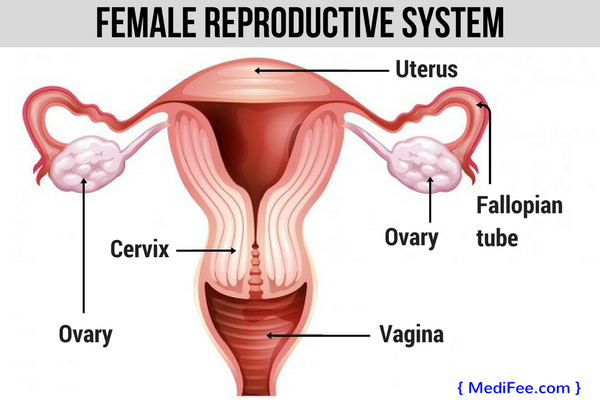
Once outside the ovary, the female egg is ready to be fertilized by the male sperm. If this happens, there is resultant pregnancy. If there is no fertilization, the contents of the uterus along with the unfertilized female egg are expelled out in the form of menstrual bleeding. Menstrual bleeding occurs once a month and lasts for 3-5 days in healthy women. Disorders of hormonal imbalance however tend to affect this pattern.
Hormonal imbalance:
The 4 hormones mentioned above form the pillars of female reproductive system. Their actions are co-dependent. Thus, any deviation from the normal working pattern of any one hormone will affect the other hormones. This in turn leads to hormonal imbalance, affecting the entire female reproductive system.
Hormonal imbalance causes impaired functioning of the female reproductive tract. This is responsible for development of several gynecological disorders.
How does PCOS develop?
PCOS is the abbreviation for Poly Cystic Ovarian Syndrome. It is one of the health conditions resulting from hormonal imbalance in the female reproductive tract. The female egg fails to develop to full maturity often. Also, due to insufficient stimulation, the ovaries fail to expel the female egg as is normally seen. As a result of this, the ovary is covered with cysts. These cysts are in reality filled with a fluid and contain female eggs which have not been expelled.
The female body normally also synthesizes small amounts of the male hormone named ‘testosterone.’ There is medical proof to believe that it is the raised levels of this testosterone which cause the other hormonal disturbances which eventually lead to PCOS. 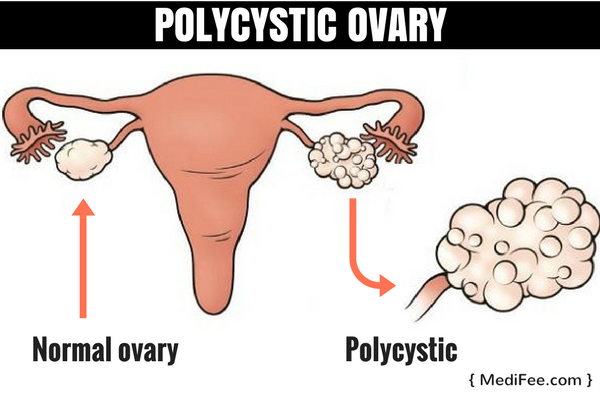
Another cause of PCOS is insulin resistance. This means that the human body fails to utilize the insulin produced by itself for acting on the blood sugar levels. This is also known to be one cause of PCOS.
What triggers the development of PCOS?
Why does LH fail to act on the ovaries? Why does the female body produce excess of the male hormone? Why does insulin resistance develop? The deeper one delves into this, there comes a point where there is no further plausible explanation. It is essential to know why the hormonal disturbance is initiated in the first place. Then the consequences can be understood.
Life now a days is very stressful in all aspects. Development of PCOS is known to be associated with stress. Factors like irregular eating habits, sleep cycle, lack of adequate physical activity are not medically connected to the development of hormones. But when these factors occur repetitively and all at once, there is high chance of resultant hormonal imbalance.
Another important feature which contributes to the development of PCOS is genetics. Medically, it has been proven that PCOS can be passed on as a hereditary condition. It is possible that if the mother has PCOS, the daughter will have PCOS. This is just a possibility. There is no evidence though that this happens in each and every case.
Signs and symptoms of PCOS:
The occurrence of PCOS has become very common these days. An enlarged ovary covered with cysts is not the only thing which defines PCOS. This is just the internal change which occurs. Much before this change can be observed, there is development of external symptoms. The most common complaint with which a woman might present is irregularity of menses. The menses are often delayed. The quantity of menstrual bleeding may be lesser than the normal pattern. Many women experience significant weight gain which has been directly attributed to the hormonal disturbance. Externally too there are several signs which can be used to detect PCOS. 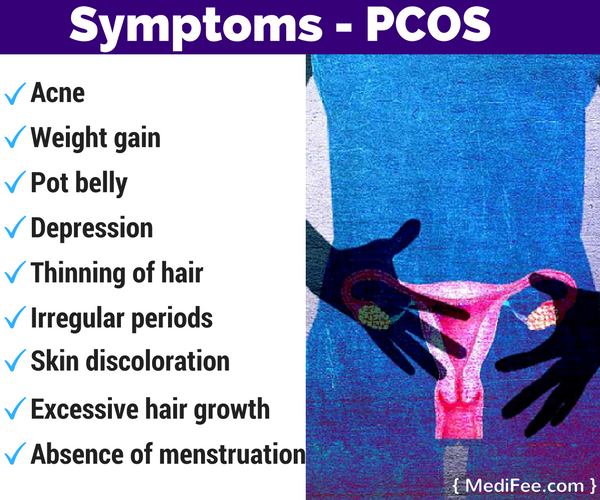
There is significant pigmentation and thickening of the skin. This dark appearance of the skin has been described to resemble velvet in some textbooks of gynecology. This peculiar appearance of the skin is medically known as Acanthosis Nigricans. Many women complain of excessive hair growth. The quality of hair is also thick and rough, which is normally observed in men. On the other hand, there may be thinning of hair on the head too. The skin quality is overall compromised. Recurrent and chronic acne is another common sign of PCOS.
PCOS is a major factor which leads to compromised fertility in women. A woman may only have inability to conceive as the major complaint.
It is very important to consider that not all of these signs and symptoms are essentially observed in all cases of PCOS. Any combination of them may be present. At times it is even possible that woman has absolutely no external signs and symptoms of PCOS, but on performing investigative tests, she is diagnosed of PCOS.
There are a few underlying pathologies associated with PCOS. They may not be externally noticed but internal degeneration is present. One of these conditions is diabetes. This develops due to the insulin resistance which has been explained earlier in the article. An additional side effect of this insulin resistance is chronic inflammation. This is mostly internal inflammation. Inflammation is a natural body defense mechanism which fights against any foreign body or any agent which can cause harm to the body. Insulin is considered by some researchers as the cause of inflammation in case of insulin resistance.
Women suffering from PCOS are known to be at risk of developing heart conditions. This can be due to the disturbance of body estrogen levels. Estrogen is known to have a protective effect on function of the heart.
Investigative tests:
The signs and symptoms of PCOS are very characteristic. However, to confirm the diagnosis, some investigative tests are necessary. Sonography of the abdomen and pelvis is often advised. This helps to visualise the ovaries, uterus, fallopian tubes for any abnormalities. In most cases of PCOS, the ovaries appear enlarged on sonography. They may be covered with cysts of varying size and number. 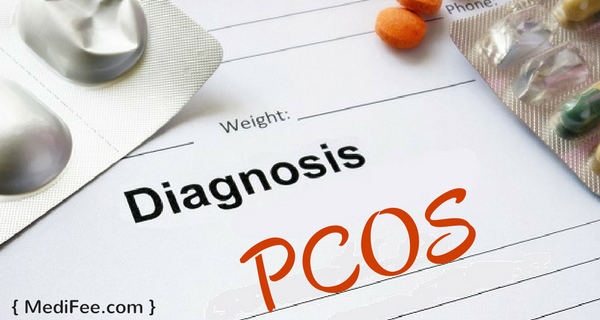
There are a few blood tests to determine hormonal levels. Women with PCOS generally exhibit high levels of testosterone. On measuring levels of FSH and LH, it is observed that the ratio of LH to FSH is elevated in women suffering from PCOS. As explained above, underlying inflammation is often associated with PCOS. This can be detected with elevated blood levels of a protein known as C-Reactive protein. The white blood cell count may also be elevated and is indicative of inflammation.
Is PCOS completely curable?
PCOS is often associated with a lot of worry and fear. Women affected by it feel that they will never be cured. It is true that as yet there is no permanent cure for PCOS. However, the symptoms of PCOS can definitely be dealt with.
The nature of treatment, its duration and its effectiveness on the patient is different for every case. It depends upon the duration of the disease, the symptoms and the extent to which the ovaries are involved.
Treating PCOS:
The words ‘cure’ and ‘treat’ have completely different meaning. Curing a disease entails destroying it completely at the root and ensuring that it won’t recur. Treating may not necessarily ensure that the disease will never resurface. But the presenting symptoms or the bothersome aspects of the disease can surely be tackled. PCOS symptoms can be treated quite efficiently using non-medical, medical or surgical methods.
Non-medical line of treatment:
This is usually the initial line of treatment. Indulgence in adequate physical exercise may be advised by the doctor. It is helpful in losing weight and maintaining it at optimum. Following a healthy diet is also of utmost importance. 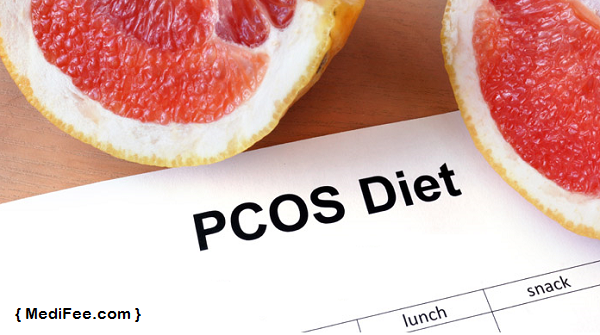 Consuming the right foods not only helps in reducing weight but is also essential for people who have underlying diabetes. Women who are at risk of developing heart conditions due to PCOS also benefit from following the regimen of diet and exercise diligently. Special care must be taken to get adequate sleep as well. Chronic sleep disturbance is known to trigger hormonal imbalance.
Consuming the right foods not only helps in reducing weight but is also essential for people who have underlying diabetes. Women who are at risk of developing heart conditions due to PCOS also benefit from following the regimen of diet and exercise diligently. Special care must be taken to get adequate sleep as well. Chronic sleep disturbance is known to trigger hormonal imbalance.
Medical line of treatment:
On diagnoses of PCOS, the medical line of treatment is generally decided and handled by a gynecologist. It is helpful in dealing with symptoms like irregular menses, inability to conceive, excessive hair growth.
Hormonal preparations which contain artificially synthesized estrogen and progesterone in optimum quantities are used. These can include birth control pills too. Hormonal treatment is usually targeted at restoring normal levels of testosterone. Skin patches or vaginal rings impregnated with progesterone and estrogen may also be used for menstrual regulation instead of oral medicines. Birth control pills containing both estrogen and progesterone are not the best treatment option for many women. In such women, pills or intra-uterine devices containing only progesterone are used.
Since release of the female egg is the major problem in PCOS, women who are looking to conceive may need special help with it. Medications which promote ovulation are helpful in such cases. 
In patients with associated diabetes or heart conditions appropriate medication to control blood sugar levels will be prescribed by the consulting physician.
For complaints like acne, excessive hair growth, thinning of hair around the head, dermatological treatment is also available. Creams for local application or oral medicines in the form of pills or tablets maybe advised to the patient.
Alternative medicinal therapies like Ayurvedic medicine and Homoepathic medicine have been gaining rapid popularity. They have shown consistent results in providing relief to PCOS patients.
Surgical line of treatment:
Surgery is most often the last option when all other modes of treatment have failed to resolve the symptoms. Wedge resection is a well known surgical method used in PCOS. It involves cutting a segment of the ovary. It has known to help in ovulation. Ovulation is of vital importance for conception. After this surgery, there may be formation of excessive adhesions around the operated ovary. Adhesions are normally formed after surgery, around the part of the organ which was operated upon. They tend to stick the injured surfaces together. If formed in excess, they may affect the normal functioning of that organ. In case of the ovaries, excessive adhesions can hamper the release of the female egg, or its transport to the uterus.
IVF is another surgical modality used in cases of PCOS. It is not directly responsible for treating PCOS. IVF helps in cases of infertility which arises out of PCOS.
Ovarian cysts removal surgery can also be conducted. It helps to eliminate cysts present in ovaries. This surgery can be performed by open method or laparoscopically, depending upon the extent of damage.
What happens if PCOS fails to respond to treatment?
Medical science is advancing with each day and newer methods of tackling diseases are being developed. Hence, total failure in tackling any disease condition happens very rarely.
The same is true for PCOS. Although, sometimes it can happen that the symptoms cannot be controlled.
In severe cases, surgical removal of ovaries needs to be done. The surgical terminology for this process is ‘oophorectomy.’ This is avoided as far as possible. But in few cases where PCOS is not responding to any other treatment, and it is worsening progressively, there may be no other option than removal of ovaries. However, once ovaries are removed, conceiving a child by natural methods does not become possible.
Complications of PCOS:
PCOS often leads to further health troubles due to involvement of other body systems. As explained earlier in this article, women with PCOS often tend to also have diabetes, heart troubles and inability to conceive. PCOS is also often associated with obesity. Obesity along with diabetes can lead to a condition known as Metabolic syndrome. In this condition, the patient’s blood sugar levels and levels of the bad cholesterol are abnormal along with increased weight. It is also associated with elevated blood pressure. This puts the patient at further risk of developing heart diseases.
Women with PCOS may sometimes develop a condition known as sleep apnea. It is likely to be seen more in obese women. In this condition, the patient’s breathing stops involuntarily for sometime while in deep sleep. 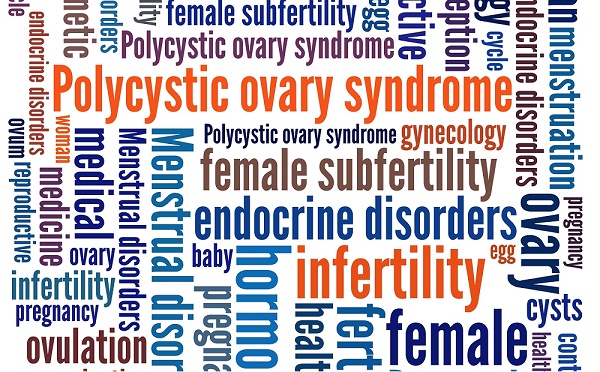 It resumes on its own after a while and is often associated with snorting sounds. Snoring may be observed in such cases. Sleep gets disturbed at night due to this and there may be a lot of sleepiness and tiredness during the day time.
It resumes on its own after a while and is often associated with snorting sounds. Snoring may be observed in such cases. Sleep gets disturbed at night due to this and there may be a lot of sleepiness and tiredness during the day time.
Anxiety and depression are also seen in cases of PCOS. They may arise out of hormonal imbalance, frustration due to symptoms of PCOS, inability to conceive or due to altered appearance because of excessive hair growth, weight gain and skin pigmentation.
Conclusion:
PCOS is a condition of hormonal imbalance which eventually affects other systems also along with the reproductive system. Restoration of normal hormonal cycle is the ultimate goal when handling a case of PCOS.
Patients with PCOS should take utmost care and follow up with the doctor religiously. The treatment should be carried on as advised and completed. During the course of treatment, any alteration in the symptoms should be duly noted and informed to the physician.
Proper understanding of the condition and treatment helps to reduce the anxiety associated with PCOS. On the patient’s part, she should try and follow a healthy lifestyle as much as possible. Even after the treatment has been completed, the woman should be cautious and aware. Any new symptoms which she feels can be associated with PCOS should be informed to the physician immediately. This will ensure avoiding a relapse of the condition and early control of the disease.
Every woman, healthy or suffering from any disease, should be aware of her health. If she feels she is having any symptoms or signs which could be PCOS, it is always better to consult the doctor soon. After all prevention is better than cure.